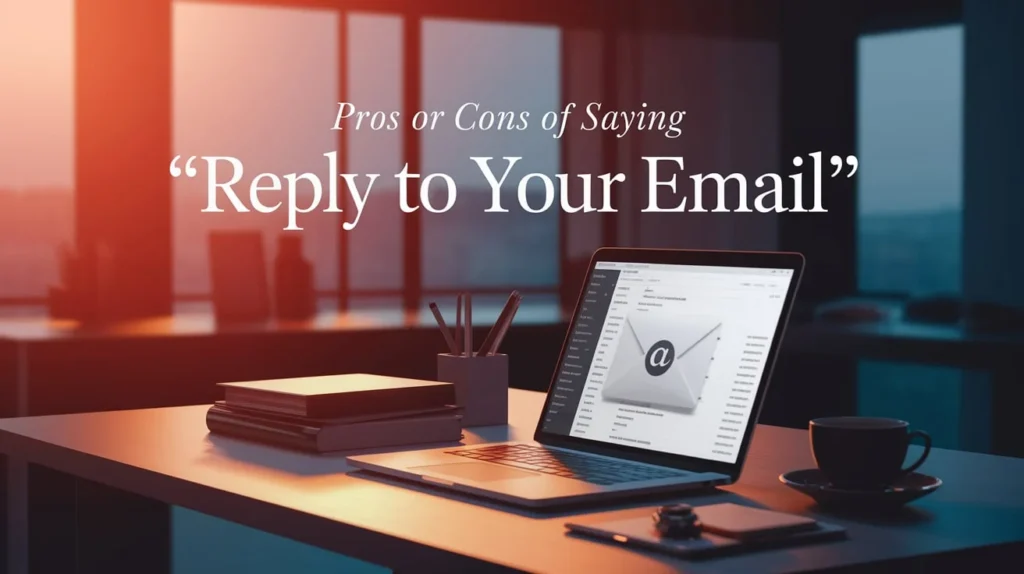In today’s fast-paced world, getting the right words to encourage someone to respond to your message is essential. Whether you’re following up on a question or gently nudging someone to reply, how you phrase your request can make a huge difference in how it’s received.
You want to sound polite, professional, and empathetic, not pushy or demanding. In this article, we’ll explore 20 thoughtful alternatives to say “Reply to your email” that will help you connect with your recipient in a more personal and engaging way.
What Does ‘Reply to Your Email’ Mean?
Before we dive into the alternatives, let’s quickly explore what “reply to your email” really means. It’s simply a request asking someone to respond to an email message that was sent to them.
Whether you’re waiting for important feedback or just need a quick confirmation, asking for a reply is a common part of email communication. But there are so many more thoughtful and nuanced ways to express this request!
Is It Professional/Polite to Say ‘Reply to Your Email’?
Saying “reply to your email” is generally professional, but it can sometimes come across as too blunt or robotic. For example, if you’re writing to a colleague or a client, it may sound a little too casual or demanding.
Instead, using one of the alternatives we’ll explore here will help soften the request and sound more thoughtful. The goal is to ask for a response in a way that feels polite, considerate, and respectful of the other person’s time.
Pros or Cons of Saying ‘Reply to Your Email’

Pros:
- Encourages feedback: It shows you’re open to hearing the recipient’s ideas, not just looking for a simple “yes” or “no.”
- Casual but professional: It’s informal enough to keep things friendly but still professional enough for most business interactions.
- Gentle request: It sounds less demanding and more like a thoughtful request for input.
Cons:
- Can be vague: Depending on the situation, asking someone to share their “thoughts” might be too open-ended and not provide clear direction.
- May not push for urgency: If you’re seeking an immediate response, this phrase may come off as too laid-back and not convey the urgency needed.
- May seem too informal: In certain contexts (like a highly formal or executive-level email), it could be viewed as too casual.
Synonyms for ‘Reply to Your Email’
- Looking forward to hearing from you
- When you get a chance, please respond
- Would appreciate your feedback
- Please let me know your thoughts
- I would love to hear from you
- Could you kindly respond when possible?
- Would love to get your reply
- Hope to hear from you soon
- Let me know when you can
- Looking forward to your reply
- Please get back to me at your earliest convenience
- Whenever you have a moment, please reply
- Would you mind getting back to me?
- Let me know if you have a moment
- Please don’t hesitate to respond
- I’d be grateful for your response
- I’m awaiting your reply
- Hope to hear from you at your earliest convenience
- Could you please get back to me?
- I look forward to your response
1. “Looking forward to hearing from you”
A gentle and friendly alternative, this phrase signals that you’re excited for a response without putting pressure on the recipient. It’s perfect for professional and personal emails, adding warmth while still encouraging action.
Scenario Example:
Subject: Follow-Up on the Meeting Notes
Hi [Name],
I hope you’re doing well! I just wanted to check in and see if you had a chance to review the notes from our meeting last week. Looking forward to hearing from you.
Best regards, [Your Name]
Best Use:
Ideal for when you want to show excitement or eagerness without sounding pushy.
Additional Note:
This phrase is often used when there’s no urgency, making it a great option for casual or semi-formal emails.
2. “When you get a chance, please respond”
This one’s perfect for a more laid-back approach, ideal for emails where the reply is important but not urgent. It keeps things polite without demanding an immediate response.
Scenario Example:
Subject: Reminder on Contract Approval
Hi [Name],
I hope you’re having a good day. I just wanted to remind you about the contract I sent over. When you get a chance, please respond. Let me know if you need anything from my side.
Best, [Your Name]
Best Use:
Great for work-related emails that don’t require an immediate reply but need attention soon.
Additional Note:
This phrase maintains respect for the other person’s time and helps you avoid sounding too demanding.
3. “Would appreciate your feedback”
When you’re looking for a reply that provides more input or an opinion, this phrase works wonders. It not only asks for a response but also subtly requests the recipient’s insight or evaluation.
Scenario Example:
Subject: Feedback Request for Project Update
Hi [Name],
I hope you’re doing well. I just finished updating the project plan and would love to hear your thoughts. Would appreciate your feedback when you get the chance.
Best, [Your Name]
Best Use:
Perfect for professional environments where you’re seeking constructive feedback or opinions.
Additional Note:
It’s a great way to ask for a response in a way that feels collaborative, rather than transactional.
4. “Please let me know your thoughts”
This one is excellent when you need a reply but want to keep the conversation open-ended. It invites the person to share their opinion or decision, making it more of a dialogue.
Scenario Example:
Subject: Follow-Up on Proposed Changes
Hi [Name],
I hope everything is going great. I wanted to follow up on the changes I suggested in the last meeting. Please let me know your thoughts when you have a moment.
Thanks, [Your Name]
Best Use:
Great for asking for input or responses that require a more reflective or thoughtful reply.
Additional Note:
It’s a friendly and polite way to invite someone’s opinion, making them feel heard and valued.
5. “I would love to hear from you”
A slightly more personal approach that works well when you’re hoping to establish or maintain a positive connection. This one conveys warmth and enthusiasm while requesting a response.
Scenario Example:
Subject: Scheduling a Catch-Up
Hi [Name],
I hope you’re doing well. I wanted to touch base about scheduling a meeting next week. I would love to hear from you about your availability.
Best regards, [Your Name]
Best Use:
Excellent for friendly or semi-formal emails where you want to add a personal touch.
Additional Note:
This phrase shows eagerness and excitement for the other person’s response, which can help create a positive tone.
6. “Could you kindly respond when possible?”
A polite and considerate way to ask for a reply, this one’s perfect for more formal or professional settings. It maintains a tone of respect and appreciation.
Scenario Example:
Subject: Urgent Matter for Discussion
Dear [Name],
I hope you’re well. I wanted to check in about the document I sent last week. Could you kindly respond when possible to confirm your thoughts?
Best regards, [Your Name]
Best Use:
Ideal for formal communications, especially when dealing with senior professionals or clients.
Additional Note:
This phrase communicates that you’re aware of their busy schedule and are requesting a response in a considerate way.
7. “Would love to get your reply”
A more conversational and relaxed way to ask for a response. This one works well when you’re aiming for a casual, friendly tone.
Scenario Example:
Subject: Catching Up After the Conference
Hi [Name],
It was great meeting you at the conference last week! Would love to get your reply about the idea we discussed. Hope to hear from you soon.
Best, [Your Name]
Best Use:
Great for informal settings, especially with colleagues or peers you’re friendly with.
Additional Note:
It’s a fun, informal way to keep the conversation going, without putting too much pressure on the other person.
8. “Hope to hear from you soon”
Simple and effective, this phrase is perfect when you want to express a little urgency without being too forward. It works well in professional and personal emails.
Scenario Example:
Subject: Finalizing Event Details
Hi [Name],
I hope you’re having a great day! I just wanted to remind you about finalizing the event details. Hope to hear from you soon so we can move forward.
Best, [Your Name]
Best Use:
A nice middle-ground approach, ideal when you need a response soon but don’t want to sound too pushy.
Additional Note:
It subtly hints at urgency while still keeping the tone friendly and approachable.
9. “Let me know when you can”
This one is casual and laid-back, perfect when you don’t want to seem too demanding. It gives the recipient flexibility on when they reply.
Scenario Example:
Subject: Quick Question About the Budget
Hi [Name],
I hope you’re doing well. I have a quick question about the budget. Let me know when you can, and I’ll be happy to chat.
Best, [Your Name]
Best Use:
Great for informal emails where a response is needed but there’s no rush.
Additional Note:
This phrase keeps things relaxed, making the person feel like they’re not under pressure.
10. “Looking forward to your reply”
A classic alternative that is still as effective today as ever. It expresses enthusiasm and patience in waiting for a response, while keeping things professional.
Scenario Example:
Subject: Update on Project Timeline
Hi [Name],
I hope you’re doing well. Just wanted to check in on the timeline for the project. Looking forward to your reply when you have a moment.
Best regards, [Your Name]
Best Use:
Perfect for professional emails where you want to keep the tone both polite and warm.
Additional Note:
A safe and friendly choice that works in most situations.
11. “Please get back to me at your earliest convenience”
This is a more formal and polite way to ask for a response, ideal for professional emails where the tone needs to stay respectful and considerate.
Scenario Example:
Subject: Request for Meeting Confirmation
Dear [Name],
I hope everything is going well. I just wanted to follow up on the meeting time we discussed. Please get back to me at your earliest convenience so we can finalize the details.
Best regards, [Your Name]
Best Use:
Perfect for formal situations when you want to be polite but still need a prompt reply.
Additional Note:
This phrase emphasizes that there’s no rush but you still need a timely response. It’s ideal for senior professionals or clients.
12. “Whenever you have a moment, please reply”
This is another friendly and flexible phrase that doesn’t rush the recipient. It keeps things laid-back while still encouraging a response.
Scenario Example:
Subject: Clarification Needed on Report
Hi [Name],
I hope you’re doing well. I was hoping to get some clarification on the report we discussed. Whenever you have a moment, please reply.
Thanks so much, [Your Name]
Best Use:
Ideal for informal emails when you don’t want to pressure someone but still need a reply.
Additional Note:
It’s a great way to show that you value the other person’s time, which can be helpful when they’re juggling multiple tasks.
13. “Would you mind getting back to me?”
A polite, softer request for a reply, this phrase works especially well in professional settings where you don’t want to sound too demanding.
Scenario Example:
Subject: Follow-Up on Outstanding Invoice
Dear [Name],
I hope you’re doing well. I wanted to check in on the status of the invoice I sent over. Would you mind getting back to me when you have a chance?
Thank you, [Your Name]
Best Use:
Ideal for semi-formal or formal emails, especially when dealing with business matters or clients.
Additional Note:
It’s a gentle way to ask for a reply without sounding too insistent.
14. “Let me know if you have a moment”
This phrase adds a layer of politeness and gives the recipient the freedom to respond when they’re able to. It’s perfect for non-urgent requests.
Scenario Example:
Subject: Quick Follow-Up on Feedback
Hi [Name],
I hope you’re having a great day. Just wanted to follow up on the feedback I requested last week. Let me know if you have a moment to send me your thoughts.
Best regards, [Your Name]
Best Use:
Great for casual or semi-formal emails when you need a response but aren’t in a hurry.
Additional Note:
This one is flexible and makes the recipient feel comfortable responding when it’s convenient for them.
15. “Please don’t hesitate to respond”
This one is a more inviting and open way of asking for a reply. It subtly encourages the recipient to feel free to respond at their earliest convenience.
Scenario Example:
Subject: Follow-Up on Proposal
Hi [Name],
I hope you’re doing well. I just wanted to follow up on the proposal I sent last week. Please don’t hesitate to respond with any thoughts or questions you may have.
Best, [Your Name]
Best Use:
A friendly, warm way to encourage a response without sounding demanding. It’s ideal for both professional and casual contexts.
Additional Note:
This phrase works especially well when you’re trying to make the recipient feel comfortable and open to replying.
16. “I’d be grateful for your response”
If you’re looking to express more gratitude and appreciation for a reply, this phrase adds a layer of politeness and shows your gratitude upfront.
Scenario Example:
Subject: Feedback Request for New Design
Hi [Name],
I hope you’re doing well! I’ve attached the new design for your review. I’d be grateful for your response whenever you have a chance.
Thanks so much, [Your Name]
Best Use:
Great for situations where you want to show appreciation and make the recipient feel valued.
Additional Note:
This phrase is a lovely way to combine respect and gratitude while requesting a response.
17. “I’m awaiting your reply”
A bit more direct but still professional, this phrase is suitable when you need a quick response without sounding too forceful. It works well in business communications.
Scenario Example:
Subject: Request for Payment Update
Dear [Name],
I hope you’re well. I wanted to check in on the payment status for the invoice I sent last week. I’m awaiting your reply to move forward with the project.
Best regards, [Your Name]
Best Use:
Ideal for situations where you need a reply quickly but still want to maintain a professional tone.
Additional Note:
It’s a bit more urgent, so it works best when there’s a real need to get a response sooner.
18. “Hope to hear from you at your earliest convenience”
This one balances a sense of urgency with a polite, flexible tone. It encourages the recipient to respond as soon as they’re able, but not in a rushed way.
Scenario Example:
Subject: Follow-Up on Open Task
Hi [Name],
I hope you’re doing well. I wanted to follow up on the open task we discussed. Hope to hear from you at your earliest convenience so we can finalize the details.
Best, [Your Name]
Best Use:
Ideal for situations where you’d like a response soon but don’t want to sound too demanding.
Additional Note:
This phrase is polite and professional, with just the right balance of urgency.
19. “Could you please get back to me?”
A slightly more formal request for a reply, this phrase works best in professional or business emails when you need a response but want to remain courteous.
Scenario Example:
Subject: Update on Client Presentation
Dear [Name],
I hope you’re doing well. I wanted to check in on the presentation materials for the client meeting next week. Could you please get back to me with an update?
Best regards, [Your Name]
Best Use:
Great for business or formal emails when you need to prompt a response without being too casual.
Additional Note:
It’s a straightforward request with a professional tone, which makes it appropriate for business contexts.
20. “I look forward to your response”
Simple, clear, and courteous, this phrase works well in both professional and casual emails. It’s a great alternative when you want to express eagerness without being pushy.
Scenario Example:
Subject: Update on Quarterly Report
Hi [Name],
I hope you’re doing well. Just checking in on the quarterly report. I look forward to your response when you have a chance.
Best, [Your Name]
Best Use:
This is a versatile phrase that works for almost any situation, balancing politeness with a touch of eagerness.
Additional Note:
This is a safe and effective option for both professional and informal contexts.
Conclusion
Asking for someone to reply to your email doesn’t have to feel mechanical or abrupt. By using any of the 20 alternatives shared in this article, you can add a thoughtful touch to your communication.
Whether you’re looking for a formal request or a more casual nudge, these phrases allow you to approach email replies with empathy and professionalism. With the right words, you can make your message feel more personal, encourage faster responses, and strengthen your connections with others.















